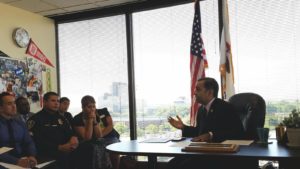Fear a factor in Trump era, Elgin-area Latino leaders tell Rep. Krishnamoorthi

Fears over deportation, split families, and diminishing opportunities are affecting the way Elgin-area residents view their futures, local advocacy group representatives said Thursday.
Rhetoric that has come from the administration of President Donald Trump and elsewhere worries local advocates and others.
“Because of the fear, what that can do is disrupt people’s lives,” said Tina Viglucci, Hispanic services manager for Gail Borden Public Library, on Thursday. “For example, if I don’t think I will be here in five years, I’m not prioritizing my education, my workforce advancement.”
Several Latino leaders, advocates and others met with U.S. Rep. Raja Krishnamoorthi on Thursday to discuss what children and adults have to say in the current political climate. Elgin-area agencies and institutions were well represented at the meeting, such as Elgin Police, School District U46 and Elgin Community College.
Krishnamoorthi, a Democrat from Schaumburg, comes from an immigrant family, having migrated with his parents from India as a child. The advancement and inclusion of people from all cultures is one of his main goals as a lawmaker, he told those at the meeting.
“At the end of the day, I believe we are a nation of laws, but we’re also a nation of immigrants and we can’t forget that,” Krishnamoorthi said.
Elgin immigration attorney Shirley Sadjadi said sharing information on what is actually going on is “powerful.” When it comes to deportations, which have garnered more attention under President Donald Trump’s administration, she said not enough is being shared.
When compared to former President Barack Obama’s immigration enforcement, the current president’s actions are about the same, she added.
“The only difference I’ve seen since all of this rhetoric, all these executive orders is the level of fear (in Elgin) — that’s it,” said Sadjadi, who is of Iranian descent. She said her parents immigrated to the United States less than a year before she was born.
“I think it’s more a tactic of this administration to scare people to death,” she said.
Discussions on the matter must begin earlier and in childhood, some in the audience said. In District U46 schools, students at the elementary grade levels are well aware of deportations and immigration, said Ushma Shah, the district’s assistant superintendent of elementary schools, instruction and equity.
After the November elections, the rhetoric had an impact, such as when some third-grade students told a pair of Latino siblings that the “government is going to take (their mom) away,” said Shah. In another incident, she said some students put up backpacks between themselves and Latino students as a makeshift wall, a reference to Trump’s border wall proposal.
In the former incident, the school principal and assistant principal conducted a “peace circle” to get a dialog going among the students about what was said, Shah added.
“We need to lean in to these conversations, and not just say, ‘Oh good, you managed it, let’s move on,'” she said. “We need to actually surface them — actively surface them — and have the difficult conversations.”
Krishnamoorthi said one of his first accomplishments as a Congressman was House approval of an increase in federal career and technical education funding he co-sponsored. The reauthorization would increase funding under the Perkins Career and Technical Education Act by 9 percent over the next 6 years for career and technical education programs. The law hasn’t been updated in more than a decade, and under this proposal it would give high schools and community colleges more control on how to use the money, which would be more than $1 billion.
If approved by the U.S. Senate and President Trump, Krishnamoorthi said immigrants, minorities and veterans would be some of the groups that benefit the most. However, if this discourse continues both locally and nationally, Krishnamoorthi and others worry groups like immigrants may stall or abandon any advancements in their education or skills growth.
“Lawlessness and hysteria is completely unacceptable,” he said. “Fear taking over people’s lives is unacceptable.”
Author: Rafael Guerrero
Original Article
